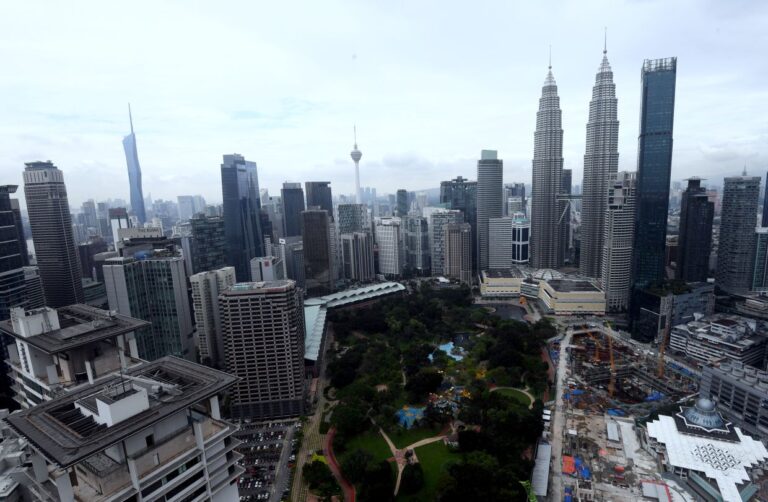PETALING JAYA: Several factors, including government reforms and strategic initiatives through foreign direct investment (FDI), are contributing to the favourable economic environment, experts say.
Malaysian Association of Small and Medium Enterprises secretary-general Chin Chee Song said another factor was Bank Negara Malaysia’s decision to keep interest rates unchanged at 3 percent.
All these, he said, managed to create a favourable economic environment which played a key role in stimulating growth.
He made the remarks after Prime Minister Anwar Ibrahim on Saturday announced an “extraordinary” achievement for the country to achieve economic growth of 5.8 percent in the second quarter of 2024 (Q2 2024).
Chin said Malaysia’s gross domestic product (GDP) growth outlook for 2023 confirms a strong economic recovery and is likely to boost foreign investor confidence.
“In the services sector, the growth was likely driven by the Hari Raya holiday season and a surge in tourists from China and India.
“Many entrepreneurs have been pleasantly surprised by the strength of this recovery, which has exceeded expectations, especially considering that many retailers experienced declining sales and reduced demand in the second quarter,” he said.
Chin added that the growth was driven by effective government policies under the Madani Economic Framework and a strong increase in domestic demand.
He also noted that the statistics bureau is predicting an optimistic outlook for the second half of the year.
“If this growth trend continues to be supported by strategic FDI and sustained government efforts, Malaysia will be on track to achieve 5% GDP growth for the full year 2024.”
“But we must remain cautious as businesses still face challenges, including rising costs and possible cuts to petrol subsidies expected to come into effect this year,” he said.
Chin added that it was important for the government to balance optimism with continued support for businesses.
He said this was to ensure sustainable and inclusive growth, especially by addressing the challenges faced by small and medium-sized enterprises, to maintain momentum and support long-term prosperity.
Malaysian Chinese Chamber of Commerce and Industry financial director-general Datuk Koon Ling Loong said the 5.8% GDP growth was mainly attributable to FDI.
He said the growth was driven by the services and manufacturing sectors, especially with FDI inflows following the prime minister’s visit to China in March last year.
Regarding the view that Malaysia is recovering amid the economic growth of Southeast Asia’s Indonesia and Vietnam, Khun said this was correct.
He also said Malaysia has a business-friendly ecosystem and strong English proficiency.
“So we can expect to see an increase in small and medium-sized enterprises in the country and become satellite industries in the supply chain,” Kuhn said.
Dr Tunku Mohar, a political commentator at the International Islamic University Malaysia, said Anwar’s announcement was made to set the correct facts about the country’s economy.
He said this was aimed at dispelling misconceptions and disinformation about the health of the country’s economy.
“The announcement was also aimed at providing confidence to investors.
“Steady economic growth will also help address people’s concerns in the long term.”
“What is important is for the prime minister to tell the people that our economy is on the right track and that this will trickle down to all of us,” Tunku Moharu said.
The statistics department on Friday projected Malaysia’s economy to expand 5.8 percent in the second quarter of 2024, up from 4.2 percent in the previous quarter and the highest since 7.4 percent in the fourth quarter of 2022.
Malaysia’s GDP grew 5% in the first half of 2024, up from 4.1% the previous year.
The ministry said economic growth in the third quarter was driven by improvements in all sectors, particularly the services, manufacturing and agriculture sectors.
“The Malaysian economy is expected to maintain its growth momentum, supported by domestic and export-led factors, with a bright outlook for the remainder of the year,” said the country’s chief statistician Datuk Seri Dr Mohamed Uzir Mahidin.
He said the services sector led the economy’s performance this quarter, with most major sectors posting higher growth than last quarter.
It expanded by 5.6% due to growth in wholesale and retail, transportation and warehousing, and finance and insurance.
Manufacturing grew 4.7 percent, supported by non-metallic mineral products, basic metals and metal fabricated products, petroleum, chemical products, rubber and plastic products, and transportation equipment.
The agriculture sector grew by 7.1%, mainly due to contributions from the oil palm and livestock sectors.
The mining and quarrying sector grew by 3.3% due to higher natural gas production.
The construction sector recorded the highest growth at 17.2%, with all subsectors performing well, particularly in civil engineering and specialised construction activity.



